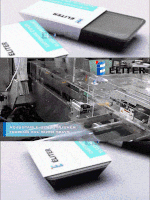Greiner Packaging presents a new generation of r-PET cups at Interpack
2023-06-08
After an intense development phase, Greiner Packaging has achieved a breakthrough in collaboration with the injector manufacturer, Engel and the mold manufacturer Brink nv. Thin-walled cups made of (r-)PET can now also be produced using injection molding technology. They are suitable for filling lines, can be sealed and have a considerable CO2e saving potential. Thus, the cooperation opens up new opportunities for packaging designed for a circular economy.
Lightweight, made from recycled material and optimally recyclable – this is what the ideal packaging should look like. For the sake of the environment, but also to comply with legal requirements. Together with Brink and Engel, Greiner Packaging has now reached a milestone on this path with the development of an r-PET injection-molded thin-walled plastic cup that is perfectly suited to industrial requirements.

Recycled PET offers a great potential for saving CO2e
High availability, food quality and high quality: these properties make r-PET the preferred material when it comes to sustainable packaging. Until now, however, PET was used especially in thermoforming applications and for injection-molded bottles and cans. The thin-walled injected cups have mainly been made with polypropylene (PP), which to date – mechanically recycled – has not received a positive opinion from the EFSA. Therefore, the use of recycled PET in injection molding opens up new possibilities, especially for food applications. Injection molded cups that were previously manufactured with PP can now also be offered in up to 100% r-PET, with the advantage that CO2e emissions are reduced up to 4 times compared to other materials.
Innovation with a touch of reality
The manufacture of the cups using the injection process ensures that the thickness of the cup walls is especially uniform, since the plastic is evenly distributed in the mold during injection, an essential aspect in terms of maximum load, quality and appearance. Injection molded cups can be decorated by IML (in-mold labeling).
Sebastian Diensthuber, Global Product Group Manager, is delighted with the innovation: “When developing PET thin-walled injection cups, it was especially important for us to develop a solution that, in addition to being innovative, would meet the industrial requirements of our customers. The cups that we have developed together with Brink and Engel are designed in such a way that a transition to the new generation of cups is possible, both in filling and in sealing.”
Moving towards the tray-by-tray cycle together
Greiner Packaging has demonstrated its power to innovate by creating a new way of producing PET cups with up to 100% recycled material in injection molding. In addition, this development demonstrates the potential that cooperation between industries has for the realization of a circular economy. In the future, it will not only be PET bottles that will serve as the starting material for new packaging. Packaging of all types should be put back into the cycle (recycled tray by tray). For example, a plastic cup should become a plastic cup again in the future.
Facts about the packaging:
- Material: PET, 70% virgin, 30% recycled material
- Volume: 200 ml
- Technology: Injection molding
- Decoration: On-mold labeling (PP)
- Wall thickness: 50mµ




